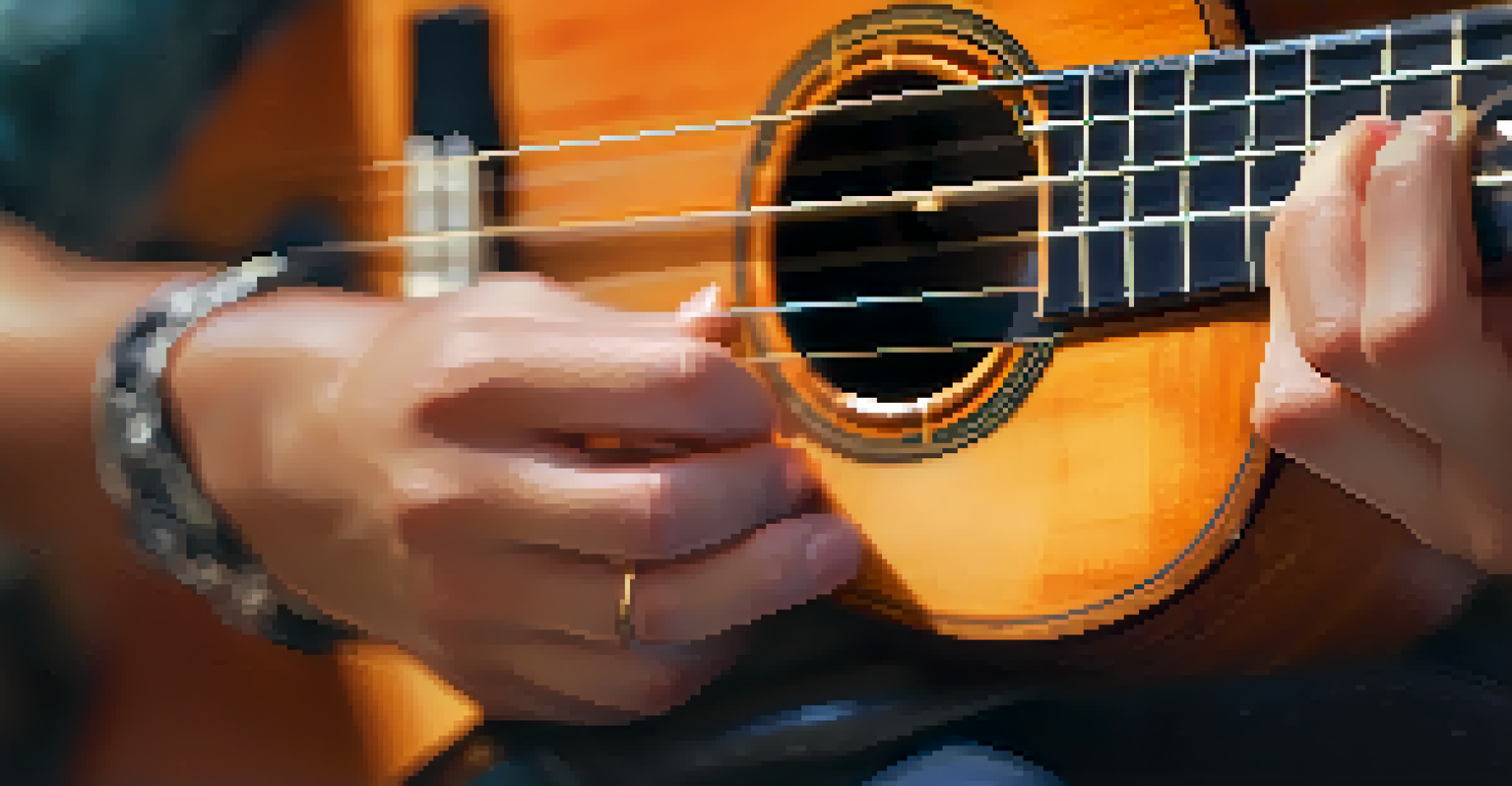Collaborating with Other Musicians for Ukulele Ideas

The Benefits of Collaborating with Other Musicians
Collaborating with other musicians can lead to exciting new ideas and perspectives. When you join forces with someone else, you not only combine your skills but also your creativity. This synergy often results in music that is richer and more diverse than what you might create alone.
Alone we can do so little; together we can do so much.
Additionally, working with others can help you learn new techniques and approaches to playing the ukulele. For instance, a guitarist might introduce you to different chord progressions or strumming patterns that elevate your sound. This kind of knowledge exchange enhances your musical growth and broadens your horizons.
Moreover, collaborations can expand your audience. By sharing your music with another artist’s fanbase, you gain exposure to new listeners who might appreciate your style. This can be a great way to build your network and increase your influence within the music community.
Finding the Right Collaborators for Your Ukulele Journey
When it comes to collaboration, finding the right musicians is crucial. Look for artists who share your musical interests and values; this ensures that the collaboration feels natural and enjoyable. You can start by engaging with local music groups, online forums, or social media platforms dedicated to ukulele enthusiasts.

Consider reaching out to fellow musicians with varying skill levels. Collaborating with someone who is more experienced can push you to improve, while working with a beginner can be a rewarding teaching experience. Each partnership brings its own unique flavor, so don’t hesitate to explore different combinations.
Collaboration Sparks Creativity
Working with other musicians combines skills and perspectives, resulting in richer and more diverse music.
Networking at open mics or jam sessions is another excellent way to meet potential collaborators. These events provide a relaxed atmosphere where you can showcase your skills and connect with others. Plus, they often lead to spontaneous collaborations that can result in unexpected and delightful musical moments.
Brainstorming Ideas for Collaborative Ukulele Projects
Once you've found your collaborators, it’s time to brainstorm ideas for your project. Start by discussing your musical influences and what you hope to achieve together. This conversation can spark creative concepts that align with all members' visions.
The whole is greater than the sum of its parts.
Try setting a theme for your collaboration, such as a specific genre or topic. For example, if you all love classic rock, consider creating a ukulele version of some iconic hits. This shared focus can guide your creative process and keep everyone on the same page.
Don't forget to encourage each other to think outside the box. Sometimes the wildest ideas can lead to the most innovative songs. For instance, mixing ukulele with electronic elements or incorporating storytelling can result in a unique sound that stands out.
Utilizing Technology to Enhance Collaboration
In today’s digital age, technology offers amazing tools for collaboration, even if you and your fellow musicians are miles apart. Apps like Zoom or Skype allow you to hold virtual jam sessions, making it easy to share ideas and music in real time. This means you can collaborate with talented musicians from anywhere in the world.
File-sharing platforms, like Dropbox or Google Drive, can also streamline your workflow. You can easily share audio recordings, sheet music, and notes, ensuring everyone stays updated and involved. This accessibility can help you maintain momentum throughout your project.
Networking Expands Your Audience
Collaborating allows you to tap into another artist's fanbase, increasing your exposure and influence in the music community.
Moreover, consider using music production software for remote collaboration. Programs like GarageBand or Ableton Live allow you to create, edit, and mix tracks together, even when you’re not in the same room. This tech-savvy approach can elevate your music and foster a more dynamic collaboration.
Setting Clear Goals for Your Collaborative Project
Before diving into your project, it’s essential to set clear goals. Discuss what you want to accomplish together—whether it’s writing new songs, recording a video, or performing live. Having these objectives in place creates a shared vision that keeps everyone motivated.
Consider outlining a timeline for your project to help manage expectations. Establish deadlines for song drafts, rehearsals, and recording sessions. This structure not only keeps you organized but also ensures that everyone is committed to the collaboration.
Finally, don’t forget to revisit your goals throughout the process. Regular check-ins can help you stay on track and make adjustments if needed. This flexibility allows for growth and evolution in your music-making journey.
Embracing Feedback and Constructive Criticism
Feedback is an essential part of the collaborative process. Encourage open and honest communication among your group, as this can lead to valuable insights and improvements. Remember, constructive criticism is meant to enhance your work, not discourage you.
When providing feedback, focus on specific aspects of the music. For instance, if a chord progression isn’t working, suggest alternatives rather than simply stating it’s not right. This approach fosters a positive atmosphere where everyone feels comfortable sharing their thoughts.
Set Goals for Success
Establishing clear objectives and timelines helps keep the collaboration organized and ensures all members remain motivated.
Moreover, be receptive to the feedback you receive. Embrace the idea that every suggestion is an opportunity for growth. By cultivating a supportive environment, you’ll not only strengthen your collaboration but also deepen your relationships with fellow musicians.
Celebrating Successes Together as Collaborators
As you wrap up your collaborative project, take the time to celebrate your successes together. Acknowledging your achievements, no matter how small, reinforces the bonds you’ve formed and boosts morale. Whether it’s a successful recording session or a well-received performance, every milestone is worth celebrating.
Consider hosting a listening party or a casual gathering to showcase your work. Sharing your music with friends and family can create a sense of community and pride. Plus, it’s a fantastic way to gather feedback from a wider audience.

Lastly, don’t forget to express gratitude to your collaborators. Recognizing their contributions and support helps to solidify your relationships. These connections can lead to future collaborations and friendships that enrich your musical journey.